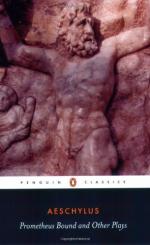|
This section contains 640 words (approx. 2 pages at 400 words per page) |

|
Guilt and Innocence
Aeschylus believed that the gods punished those guilty of human pride (hubris) by trapping them in a web of crime and revenge, from which only the gods could free them. While the reasons behind the gods' actions remain mysterious, for Aeschylus, humanity must subordinate itself to divine will, which ultimately achieves justice. In Prometheus Bound, this notion of inherited guilt emerges during the Titan's discussion of Necessity.
Love and Passion
Zeus feels lust for Io and follows her, hoping to seduce her. Although Io wants nothing to do with Zeus, he infects her dreams, causes her to be driven from her family and home, and sees her tormented by his jealous wife, Hera. His lust makes him behave unreasonably and Io, an innocent person, suffers because of him. According to classical ethics, as exemplified by Aristotle's Nichomachean Ethics, for example, moderate, reasonable be havior best suits...
|
This section contains 640 words (approx. 2 pages at 400 words per page) |

|




